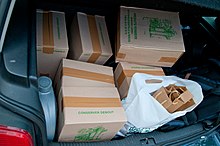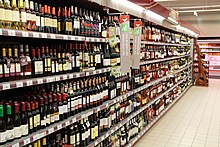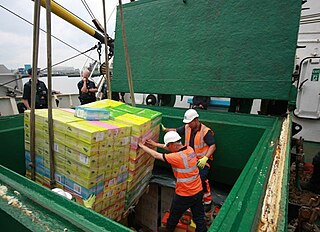
Smuggling is the illegal transportation of objects, substances, information or people, such as out of a house or buildings, into a prison, or across an international border, in violation of applicable laws or other regulations. More broadly, social scientists define smuggling as the purposeful movement across a border in contravention to the relevant legal frameworks.

A cigarette is a narrow cylinder containing a combustible material, typically tobacco, that is rolled into thin paper for smoking. The cigarette is ignited at one end, causing it to smolder; the resulting smoke is orally inhaled via the opposite end. Cigarette smoking is the most common method of tobacco consumption. The term cigarette, as commonly used, refers to a tobacco cigarette, but the word is sometimes used to refer to other substances, such as a cannabis cigarette or an herbal cigarette. A cigarette is distinguished from a cigar by its usually smaller size, use of processed leaf, and paper wrapping, which is typically white.

The economy of Andorra is a developed and free market economy driven by finance, retail, and tourism. The country's gross domestic product (GDP) was US$5.30 billion in 2022. Attractive for shoppers from France and Spain as a free port, Andorra also has developed active summer and winter tourist resorts. With some 270 hotels and 400 restaurants, as well as many shops, the tourist trade employs a growing portion of the domestic labour force. An estimated 13 million tourists visit annually.

The European Anti-Fraud Office is a body mandated by the European Union (EU) with protecting the Union's financial interests. It was founded on 28 April 1999, under the European Commission Decision 1999/352. Its tasks are threefold:
Excise tax in the United States is an indirect tax on listed items. Excise taxes can be and are made by federal, state and local governments and are not uniform throughout the United States. Certain goods, such as gasoline, diesel fuel, alcohol, and tobacco products, are taxed by multiple governments simultaneously. Some excise taxes are collected from the producer or retailer and not paid directly by the consumer, and as such often remain "hidden" in the price of a product or service, rather than being listed separately.

Border trade, in general, refers to the flow of goods and services across the border between different jurisdictions. In this sense, border trade is a part of the normal trade that flows through the ordinary export/import legal and logistical frameworks of nations and smaller jurisdictions. However border trade specifically refers to the increase in trade in areas where crossing borders is relatively easy and where products are significantly less expensive on one side of the border than the other – often because of significant variations in taxation levels on goods. Common items involved in border trade include alcohol, tobacco, medication, recreational drugs, automobiles, automotive fuel, groceries, furniture and clothing.

A duty-free shop is a retail outlet whose goods are exempt from the payment of certain local or national taxes and duties, on the requirement that the goods sold will be sold to travelers who will take them out of the country, who will then pay duties and taxes in their destination country. Which products can be sold duty-free vary by jurisdiction, as well as how they can be sold, and the process of calculating the duty or refunding the duty component.

Drum is a Dutch brand of fine-cut handrolling tobacco, or shag, introduced in 1952. It was originally produced and distributed by the Douwe Egberts corporation. Douwe Egberts was purchased by the Sara Lee Corporation, which sold Drum to Imperial Brands, the current British producer.

Adinkerke is a village in the municipality of De Panne in western Belgium close to the French border. It forms a conurbation with the coastal town of De Panne, which in turn is part of the west Belgian coastal conurbation. Adinkerke railway station is also the western terminus of the Belgian coast tram line to De Panne; Nieuwpoort, Ostend and beyond. Near the city is Plopsaland, formerly Meli Park.

An excise, or excise tax, is any duty on manufactured goods that is normally levied at the moment of manufacture for internal consumption rather than at sale. Excises are often associated with customs duties, which are levied on pre-existing goods when they cross a designated border in a specific direction; customs are levied on goods that become taxable items at the border, while excise is levied on goods that came into existence inland.

Sovereign Base Areas Customs and Immigration is a semi-autonomous branch of HM Revenue and Customs (HMRC) of the United Kingdom. It has jurisdiction over Akrotiri and Dhekelia, a British Overseas Territory on the island of Cyprus, administered as a Sovereign Base Area, and home to British Forces Cyprus. It is managed by the Ministry of Defence (MoD) and around 3,500 military personnel are posted there at any one time.

A black market, underground economy, or shadow economy is a clandestine market or series of transactions that has some aspect of illegality or is characterized by noncompliance with an institutional set of rules. If the rule defines the set of goods and services whose production and distribution is prohibited by law, non-compliance with the rule constitutes a black market trade since the transaction itself is illegal. Parties engaging in the production or distribution of prohibited goods and services are members of the illegal economy. Examples include the illegal drug trade, prostitution, illegal currency transactions, and human trafficking. Violations of the tax code involving income tax evasion constitute membership in the unreported economy.

An excise stamp is a type of revenue stamp affixed to some exciseable goods to indicate that the required excise tax has been paid by the manufacturer. They are securities printed by the finance ministry of the relevant country.
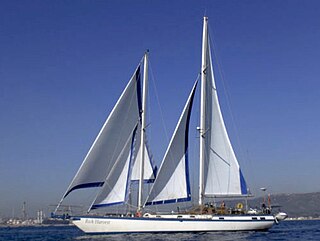
The offshore off-licence is the name coined by the media to describe a 2004 venture to bring "tax- and duty-free" alcohol and cigarettes to Teesside, England, by selling the imported goods from a boat anchored just outside the UK's 12-mile limit. Two businessmen, Phil Berriman and Trevor Lyons, a maritime law expert, used the latter's 72-foot staysail schooner Rich Harvest to transport large quantities of cigarettes and spirits from Heligoland to Hartlepool. The vessel was anchored a little more than 12 miles offshore, and people from Hartlepool came out in private boats to buy the untaxed goods. Customers would then ostensibly be allowed to bring their purchases into the UK using their duty-free allowance.

Border Force (BF) is a law-enforcement command within the Home Office, responsible for frontline border control operations at air, sea and rail ports in the United Kingdom. The force was part of the now defunct UK Border Agency from its establishment in 2008 until Home Secretary Theresa May demerged it in March 2012 after severe criticism of the senior management.

MyFerryLink was an English Channel passenger and freight ferry company which began operating between Dover and Calais in August 2012. The MyFerryLink fleet consisted of two modern ferries – sister ships the MS Rodin and the MS Berlioz – that carried passengers and freight, and one dedicated freight ship, the MS Nord Pas-de-Calais. It was formed following the liquidation of SeaFrance. MyFerryLink offered passengers up to sixteen sailings between Dover and Calais every day, and additional services for freight.

The illicit cigarette trade is defined as "the production, import, export, purchase, sale, or possession of tobacco goods which fail to comply with legislation". Illicit cigarette trade activities fall under 3 categories:
- Contraband: cigarettes smuggled from abroad without domestic duty paid;
- Counterfeit: cigarettes manufactured without authorization of the rightful owners, with intent to deceive consumers and to avoid paying duty;
- Illicit whites: brands manufactured legitimately in one country, but smuggled and sold in another without duties being paid.
Regulation of electronic cigarettes varies across countries and states, ranging from no regulation to banning them entirely. As of 2015, around two thirds of major nations have regulated e-cigarettes in some way.
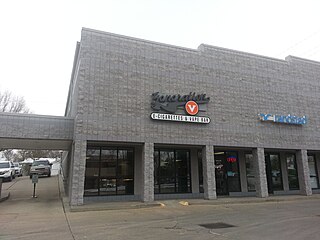
A vape shop is a retail outlet specializing in the selling of electronic cigarette products, though shops selling derived psychoactive cannabis products have increased since the passage of the 2018 Farm Bill. There are also online vape shops. A vape shop offers a range of e-cigarette products. The majority of vape shops do not sell e-cigarette products that are from "Big Tobacco" companies. In 2013, online search engine searches on vape shops surpassed searches on e-cigarettes. Around a third of all sales of e-cigarette products take place in vape shops. Big Tobacco believes the independent e-cigarette market is a threat to their interests.
A customs declaration is a form that lists the details of goods that are being imported or exported when a citizen or visitor enters a customs territory. Most countries require travellers to complete a customs declaration form when bringing notified goods across international borders. Posting items via international mail also requires the sending party to complete a customs declaration form.
